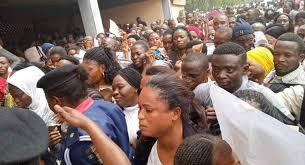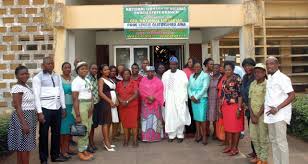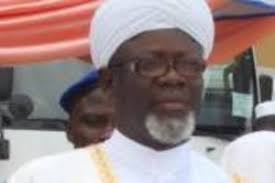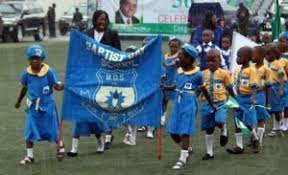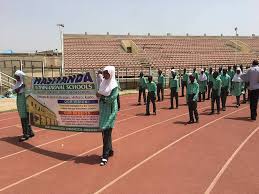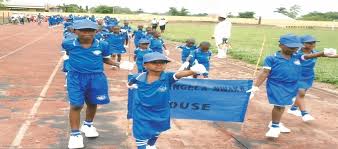Education
Recruit Teachers on Merit Not on Political considerations- Applicants to Oyo Govt.
- By solomon2day
- On 03/03/2020
- Comments (0)
- In News
Applicants fopr the 7,000 teaching jobs in Oyo state have appealed to the state Government to ensure that the recruitment process is not characterized by personal and political considerations.
The applicants made this appeal at the Teaching Service Commission zonal offices across the state, during the submission of their completed application forms.
''Government should not allow the recruitment process to be colorated by political and personal considerations. , but it should be based on merit'', the applicants stated.
Sadly, the questionable recruitment process in the past had resulted in the worrisome attitude and behavior of students in public schools in the state, with those in the private schools also in focus.
Cultism, rape and armed robbery are now past times of a sizable number of secondary school students, while parents, guardians and school authorities watch helplessly.
In his views, the Chairman of the state Council of the Nigeria Union of Teachers, Comrade Tojuade Adedoyin disclosed that the recruitment was a welcome development saying'' it has been long overdue. However, we are believing that they will follow due process by recruiting qualified teachers on merit and not for political patronage''.
National Library Act Non Compliance-Govt MDAs are Culpable-National Library
- By solomon2day
- On 09/12/2019
- Comments (0)
- In News
 The failure of authors, publishers and Government Ministries, Departments and Agencies to abide by the legal deposit law in Nigeria and poor funding have been identified as the major challenges confronting the National Library of Nigeria(NLN).
The failure of authors, publishers and Government Ministries, Departments and Agencies to abide by the legal deposit law in Nigeria and poor funding have been identified as the major challenges confronting the National Library of Nigeria(NLN).
This was the submission of Mrs. Laureta Isioma Ekwemuka of the Legal Deposit Department of the National Library, in a paper titled ‘’Evaluation of Legal Deposit Collection at the National Library of Nigeria(2014–2018) at the South Western zonal session of the Nationa Library two day sensitization workshop on Legal Deposit Compliance ISBN & ISSN, held in Ibadan.
‘’Some major challenges of the National Library include the uncooperative attitude of Authors, Publishers, Government Ministries, Departments and Agencies, when it comes to the submission of copies of published works to the National Library. So many Government Ministries, Departments and Agencies publish quarterly, bi-annually and annually, but they do not deposit copies of their published works to the National Library. Another major challenge is lack of adequate funding. We have been trying our best to overcome these challenges’’, Mrs. Ekwemuka stated.
Similarly, in a paper titled ‘’Evaluation of ISBN/ISSN Acquisition at the National Library of Nigeria(2014–2018), Mrs Taye Abena of the International Standards and Programs Departments expressed worry over the proliferation of fake ISBN numbers saying’’ people tend to do things their own way, they go to publishers to collect fake ISBN. The ISBN is 13 digits, in the process of collection, 3 digits are removed, and these three digits represent the numbers of the international center’’.
In his remarks, the Head of Branch, Oyo state, Mr. Bashiru Salawu warned Nigerians not to obtain the ISBN and ISSN from sources other than the National Library, adding’’ISBN and ISSN emanating from other sources are fake’’.
The National Library Act was passed in 1964 and later reviewed in 1970 with emphasis on deposit obligations and bibliographical functions.
The Act №29 of 1970 applies throughout the country and has supremacy over any library laws of state governments in the event of jurisdiction conflicts. Read the Act here-https://bit.ly/2Pou5ck
Today's Teachers are in the Profession to Keep Body and Soul Together-Prof. Olagoke
- By solomon2day
- On 18/11/2019
- Comments (0)
- In The People Talk
Nigerians are unanimous in their clamor for the re-introduction of Teacher Training Colleges as part of the efforts to salvage the falling standard of education in the country from total collapse.
Indeed, a sizable number of teachers have overtime exhibited tendencies and behaviors not in line with the dictates of the noble profession, while pupils and students alike have emulated same.
In this interview, the Founder, Spiritual Head and Grand Imam of Shafaudeen-in-Islam Wordlwide, Prof. Sabitu Olagoke insists that present day teachers are in the noble profession for the purposes of survival not for the love of the profession. Excerpts :
Do you think the re-introduction of Teacher Training Colleges would play a significant role in salvaging the falling standard of education in Nigeria ?
The policy makers over the years in Nigeria have displayed a high level of over zealousness when it comes to adopting to adapt new trends in the areas of advancement in education.
They failed to look inwards, our cultural background and the needs of the society. The basic background that could be traced to 6–5–4 system of education, whereby the five years in the secondary school could be augmented with advanced level classes, before proceeding into the universities. This was far better mainly because it was effectively managed in terms of teachers and the facilities needed on ground. Some people may adduce this to the fewer number of schools and teachers as well as fewer population of students to cope with then.
The greatest advantages then, were the people’s appreciation of the value of education, the immediate opportunity for graduates to be absorbed from the labor market as well as the best discipline on offer as a necessary prerequisite that would enable seriousness in learning.
It was an era when boarding schools were facility laden with trustworthy house masters.
It was also a period when religious houses were sacred for the much needed vitamins of the fear of God for the teachers and the students.
However, with the advancement of education, it was good to discontinue the use of auxiliary teachers, most of whom were more matured and committed in the classrooms, than today’s graduates, most of whom are unhappy with the teaching profession, but for economic survival, take the teaching job to keep body and soul together.
The establishment of the Universal Primary Education(UPE) for which Teacher Training Colleges became popular, was a very good policy in the right direction.
The graduates were basically trained on the methodology of teaching in education, the preparation of lesson notes and the keeping of records in an environment of high level of discipline and respect for constituted authority with a high level of focus on building a happy home in which future leaders for the society in particular and nation as a whole must be brought up.
Graduates of the Teacher Training Colleges were fully committed to the profession and were always time conscious with respect to punctuality and regularity at work. They were always ready to be directed and managed by their Headmasters or Principals, whose instructions must be obeyed and who happened to be graduates of universities, most of whom took courses in education at the post graduate level, with Grade I and II qualifications in their kitty before acquiring university education.
Headmasters and Teachers were then role model parents who believed in working for government for good, holding tenaciously to the principles of transparency and accountability.
Government would have left this phase of our educational institutions when creating the Colleges of Education, rather than phasing it out.
They ought to have restricted the activities of graduates of Teacher Training Colleges to the grassroots level of Primary Schools, while those in Colleges of Education would have been trained for the Junior Secondary Schools in the 6–3–3–4 education system.
While graduates of universities and probably Polytechnics at the HND level all with technical bias towards specific vocations, with some knowledge in entrepreneurship studies would have been prepared to manage our Secondary schools. With this arrangement based on relevant disciplines and subjects, the instructional facet of all segments of our educational levels would have been appropriately captured and fixed. This is because graduates of each sector of our lines of educational development and structure have good opportunities of resorting to, based on their capacity and capability at the time, apprenticeship for artisan ship, vocation and entrepreneurship for possible self job creation ability and promotion of employment opportunities for others, to lessen the pressure on graduates hustle for white collar jobs.
The mistake made in the phasing out of the Teacher Training Colleges, is the present mistake that is about to be repeated in the case of the Technical Colleges, which would have served the nation if well funded and equipped in the following areas :
- Foundational step to engineering and other professional technical appreciation needs.
- It would have been a technical forum to train our artisans, who control our economy on the need for skill acquisition and proficiency needs. The class would have been for the development of initiative, innovation and creativity as and a center for talent discovery.
Generally, Nigeria’s policymakers, most especially in the areas of education, must always take cognizance of our background and our needs for our graduates to be relevant directly in the areas of community service, society development and nation building.
After all, all our professional bodies have family pyramid structure. For example, craftsmanship, technicians, technologists and corporate membership. All of them are yet to take care of sectors of artisan ship for proficiency needs while their fellow cadres are yet to be specifically saddled with serious assignments of mentor ship, research and development .
Suffice it now to say, that no segment of our educational system like the Teacher Training and Technical Colleges should be phased out or neglected because our developmental needs in Nigeria have not outgrown them.
The two sectors would have assisted us in bridging the gap between the needed strong foundation and the advanced stages of education and development.
In the area of affective education, happenings in our schools, Primary, Secondary and Universities are characterized by examination malpractices, sex-for-marks scandals, cultism, admission racketeering among others. All these portends that the goal of education regarding our attitudinal correction are yet to be effected.
Kleptocracy in governance equally reflects in the activities of these graduates, old or new, as an attestation that there is not no single impact of what they learned in their behavior.
In the area of cognitive education, there is a misplacement of priorities. For example, we have failed to run effectively our Polytechnic system as a result of a lack of facility update for research and development and the training need of students to be in tandem with the necessary industrial essence with what obtains in companies.
Nigerian graduates still need to undergo a lot of training before they can be certified fit for employment in industries.
Why is it that Nigeria is just realizing the need for technical universities ?
To what extent have our Schools and Universities of Agriculture served the nation in terms of poverty alleviation and eradication ?
Why is it that there is still limited spaces for successful candidates, who passed the UTME and post UTME in the educational institutions in the country ?
Recently, China retraced its steps, on the need to survive through the development of technical education and technological development, by converting 600 of its universities into polytechnics while Nigeria is on the verge of collapsing the HND certificate program.
Policy making must go beyond the rhetoric of politics because it is about the life of our people and the future of the nation.
Shortage of Qualified Teachers in Oyo State a Problem-Rev. Alamu
- By solomon2day
- On 05/10/2019
- Comments (0)
- In News
The dearth of trained teachers in Oyo state has been blamed on the reluctance of successive administrations in the state to address the problem.
This assertion was made by Reverend J.A Alamu, who was the chairman at an event with theme’’YOUNG TEACHERS, FUTURE OF THE PROFESSION’’, organized by the state council of the Nigeria Union of Teachers(NUT)to commemorate the International Teachers day in Ibadan, Nigeria.
‘’I shall be happy if our present government can look into this. We knew how we recruited teachers in those days, most of whom came into the profession without formal training, but we were committed, we climbed the ladder until we became true professionals. Since the teacher training was abolished, we have run into a problem of not having trained teachers.’’
‘’ This problem can be remedied. If we can’t re-introduce teacher training, we can work hard on training and retraining. All of you who came into the profession between 20 and 30 years ago are retiring, where are we heading to ? The government should do something about it, if we want to make progress in the education sector of this state and Nigeria generally. I hope the present regime under my son, Seyi Makinde will look into this, deliver my message, tell him Alamu said so. May God grant all of us long life to reap the fruits of this great profession,’’ Reverend Alamu concluded.
In his remarks, the Chairman of the NUT in the state, Comrade Tojuade Adedoyin appealed to the state government to as a matter of urgency engage the services of trained, qualified and competent teachers.
‘’Your excellency Sir, let me call your attention to the urgent need for the recruitment of new teachers in both primary and secondary schools in the state. Sir, the current statistics obtained across the state on the dwindling number of our teachers occasioned by the retirement of our teachers without new recruitment several years back needs much to be done by your administration.
‘’This year alone, Sir over two thousand(2,000) teachers have retired as at 30th September, 2019. The leadership of NUT is strongly appealing to the government to urgently employ trained and qualified teachers devoid of much political maneuvering and interference as we believe that the recruitment should be based mostly on merit’’, Comrade Adedoyin stated.
Of worry, is the fact that the shortage of qualified and competent teachers is already taking its toll on the attitude, behavior and activities of pupils and students alike.
Majority of them now use obscene language, as medium of expression, exhibit uncouth behavior and engage in crime as a means to an end.
For better understanding of the almost hopeless situation, most children of school age,primary and secondary school age, particularly residing at, but not limited to Olorunsogo, Molete in Ibadan display behavior and ways of life synonymous with crime. While the girls engage in prostitution, the boys take to various forms of crime. The high rate of drop outs in this community is already a problem. Those yet to drop out, attend both public and private schools.
Education Officials, Head Teachers and Food Vendors Sabotage the School Feeding Program-Prof. Olagoke
- By solomon2day
- On 30/07/2019
- Comments (0)
- In Special Report
 The Federal Government recently disclosed that 9.9 million pupils in 56, 000 Primary schools in Nigeria have benefited from the School Feeding Program , suggesting that this achievement, to a great extent, has impacted positively on the worrisome standard of education in the country.
The Federal Government recently disclosed that 9.9 million pupils in 56, 000 Primary schools in Nigeria have benefited from the School Feeding Program , suggesting that this achievement, to a great extent, has impacted positively on the worrisome standard of education in the country.
Nigerians dispute this claim, while stressing that government has done little or nothing to overhaul dilapidated school infrastructure, replace damaged desks and chairs, recruit qualified teachers, ensure prompt payment of teachers' salaries and provide relevant teaching aids.
This is made more problematic with the appointment of those who are not technically fit to oversee the education sector.
In this interview, the Founder, Spiritual Head and Gran Imam of Shafaudeen-in-Islam Worldwide, Prof. Sabitu Olagoke opines that the lack of proper monitoring mechanism of the program has made saboteurs to use it to enrich themselves. Excerpts :
Do you think the school feeding program of the Federal Government has made a positive impact on the standard of education at the Primary school level ?
We need to appreciate the Federal Government's efforts under President Muhammadu Buhari for venturing into the feeding of pupils in our primary schools because the government before him never heeded to the clarion call for free mid-day meal for our children at their formative age, whereby balanced diet would ever have direct impact on their growth and their reasoning faculties.
However, as good as the policy is, the program has suffered a lot; because of its poor implementation .
In the first, place it does not cut across board, considering the number of public schools in Nigeria.
If the figure the government claims to have attained, is to be reckoned with, we have more than 9.9 million children in our public primary schools and the number of schools is more than 56,000.
Apart from these lapses, the Federal Government does not have any serious monitoring mechanism, giving way for saboteurs to enrich themselves through the program.
The connivance between some fraudulent education officials, some Head Teachers and the food vendors, has made it possible to shortchange the children because there are cases of some schools where one egg is usually shared into 16 places while the the quality of food is poor in most cases.
The major objective of the program is not only to serve the children with balanced diet, but to enable children of the poor to equally attend school as well as to increase the number of children who attend classes; courtesy of the relief the mid-day meal must have brought about for the poor parents, whose children had earlier been denied access to basic education.
In terms of statistics, therefore, for class attendance there has not been a remarkable increase.
Worse still, the government officials and elite sponsoring this program of mid-day meals have failed totally to patronize public schools, but instead send their children and wards to either expensive choice private schools, ignorantly assessed to befit their status or rather send them overseas or to neighboring countries considered to be functional education friendly.
If their children or grand children attend these schools, government would never be at the mercy of relying on false information, regarding the fairness of the program and correctness of the impact, the program must have had on pupils, school performance and the needed improvement in class attendance.
Government needs to establish an independent body, saddled with the responsibility of monitoring the implementation of the program, with adequate transparency and accountability.
This would enable the barriers of project implementation with impunity to be broken, for government's efforts to yield the desired results.
Generally, therefore, government must equally charge the mass media, most especially the electronics, to embark on sensitization and assessment reports through the peoples' parliament for it to have accurate and reliable data through the pulse of the nation. This would bring offenders to book and would serve as deterrence to those who might have such intentions.
The program is laudable but implementation and the low involvement of the children of the elite, serves to weaken the expected effectiveness of the program as well as serving as threats because it is very hard for the people to feel the impact due to the various listed barriers and acts of sabotage that are yet to be addressed.
May 27 : Nigerian Children Hopeful
- By solomon2day
- On 27/05/2019
- Comments (0)
- In Pictures

